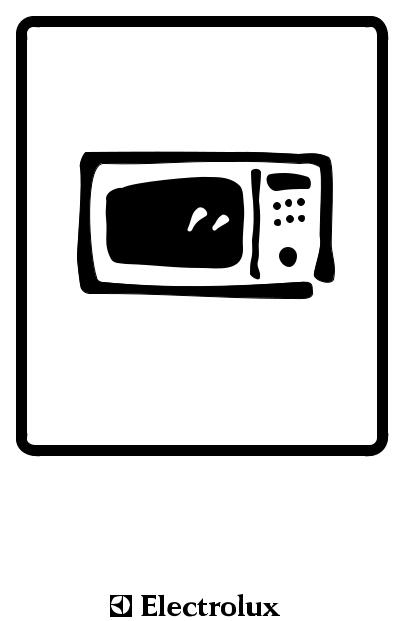AEG-Electrolux EMM1900S User Manual

User Manual
Model EMM1900
822191326 -01 |
English |
EMM1900 |
English |
|
|
Contents |
|
Before using your microwave oven |
4 |
Safety instructions |
4 |
– Utensil safety |
4 |
– Testing suitability of cookware |
5 |
– Food safety |
5 |
– Oven utensils and accessories guide |
6 |
Technical data |
6 |
Getting Started |
7 |
– Unpacking |
7 |
Installation |
7 |
– Connecting to the mains |
7 |
– Electrical connections |
7 |
How to operate your microwave oven |
8 |
– Name and function of parts |
8 |
– Turntable Installation |
8 |
– Control panel |
9 |
– Microwave Cooking |
10 |
– Microwave Power Setting Guide |
10 |
– Defrosting instructions |
11 |
– Microwave Hints |
12 |
– Care and cleaning |
13 |
– Cleaning the accessories (turntable and support) |
13 |
– Cleaning the interior |
13 |
– Cleaning the exterior |
13 |
Service and Spare Parts |
14 |
3

EMM1900 |
English |
'SRKVEXYPEXMSRW SR XLI TYVGLEWI SJ ]SYV RI[ 1MGVS[EZI 3ZIR
Thank you for having chosen a Electrolux product. We are convinced that you will find your new microwave oven very useful and that it will be of great help to you. As with all new kitchen appliances, it will take some time to learn all the new functions and features, but with time, this oven will become indispensable to you.
Before using your Microwave Oven
Read through the instruction manual carefully and ensure that you follow the recommendations given, these instructions have been prepared so that you get the best from your new Electrolux Microwave Oven.
It is important that this instruction book is retained with the appliance for future reference. Should the appliance be sold or transferred to another owner, or if you move house and leave the appliance, always ensure that the book is supplied with the appliance so that the new owner can be acquainted with the functioning of the appliance and the relevant warnings.
Safety Instructions
•The built-in safety interlock switches prevent the microwave oven from operating when the door is open.
•Do not tamper with them, or attempt to operate the oven with the door open as open door operation can result in exposure to microwave energy.
•Do not allow food spills or cleaner residue to accumulate on door sealing surfaces. See the Cleaning and Care section for cleaning instructions.
•Do not operate the oven if it is damaged until it has been repaired by qualified service personnel.
•It is particularly important that the oven door closes properly and that there is no damage to the: (1) door (warped), (2) hinges and latches (broken or insecure), (3) door seals and sealing surface.
•Under no circumstances should you attempt to repair the appliance yourself. Repairs carried out by inexperienced persons may cause injury or serious malfunctioning. Contact your local Service Force Centre.
•Do not remove the outer case, door or control panel at any time. Doing so may cause exposure to extremely high voltage.
•Install or locate this oven only in accordance with
“INSTALLATION INSTRUCTIONS” found in this manual.
•Use the appliance for its intended use as described in this manual. Do not use corrosive chemicals in this appliance. This type of oven is specifically designed to heat, cook, or defrost food. It is not designed for industrial or laboratory use neither for commercial use as this will invalidate the guarantee.
•Do not operate the oven empty. If food or water is not present to absorb the microwave energy, the magnetron tube can be damaged.
•Close supervision is necessary when the oven is used by children.
•Do not store this appliance outdoors. Do not use this product near water.
•Do not attempt to dry clothing or newspapers in the microwave oven. These items can ignite.
•Do not use the cavity for storage purposes. Do not leave paper products, cooking utensils, or food in the cavity when not in use.
Utensil safety
Most glass, glass ceramic and heat-resistant glassware utensils are excellent for use in the microwave oven. Although microwave energy will not heat most glass and ceramic items, these utensils can become hot as heat transfers from the food to the container. The use of oven gloves to remove dishes is recommended.
4
EMM1900 |
|
English |
|
|
|
Testing suitability of cookware |
|
Food safety |
|
|
|
•Place the cookware in the cavity along with a glass half full of water. Heat on 800 W (100%) for one minute. If the cookware feels hot, you should not use it. If it is just slightly warm, you can use it for reheating but not for cooking. If the dish is room temperature, it is suitable for microwave cooking.
•Paper napkins, wax paper, paper towels, plates, cups, cartons, freezer wrap and cardboard are great convenience utensils. Always be sure containers are filled with food to absorb energy and thus avoid the possibility of overheating.
•Many plastic dishes, cups, freezer containers and plastic wraps may be used in the microwave oven. Follow manufacturer’s instructions when using plastics in the oven. Avoid using plastic utensils with foods that have high fat or sugar content since these foods reach high temperatures and could melt some plastics.
•Do not leave oven unattended, and look at it from time to time when heating or cooking food in plastic, paper or other combustible containers. If smoke is observed, keep door closed, switch the oven off or disconnect oven until smoke stops.
•Metal utensils and utensils with metallic trim should not be used in the microwave oven, unless specifically recommended for microwave use.
•Containers with restricted openings, such as bottles, should not be used for microwave cooking.
•Use caution when removing a lid or cover from a dish to avoid steam burns.
•Do not heat food in a can in the microwave oven. Always remove the food to a suitable container.
•Deep fat frying should not be done in the microwave oven, because the fat temperature cannot be controlled, hazardous situations can result.
•Popcorn may be prepared in the microwave oven, but only in special packages or utensils designed specifically for this purpose. This cooking operation should never be un-attended.
•Pierce foods with non-porous skins or membranes to prevent steam build-up and bursting. Apples, potatoes, chicken livers, and egg yolks are examples of items that should be pierced.
WARNING: When heating liquids, e.g. soups, sauces and beverages in your microwave oven, overheating the liquid beyond boiling point can occur without evidence of bubbling. This could result in a sudden boil over of the hot liquid. To prevent this possibility the following steps should be taken:
1.Avoid using straight-sided containers with narrow necks.
2.Do not overheat.
3.Stir the liquid before placing the container in the oven and again halfway through the heating time.
4.After heating, allow to stand in the oven for a short time, stirring again before carefully removing the container.
•Some products such as whole eggs and sealed containers – for example, closed glass jars – may explode and should not be heated in this oven. Occasionally, poached eggs may explode during cooking. Always pierce the yolk, then cover and allow the standing time of one minute before removing cover.
NOTE:
•Do not force the turntable to rotate by hand. This may cause malfunctioning.
•Arcing in the oven during microwave operation usually occurs from use of metallic utensils. Continuous arcing, however, can damage the unit. Stop the programme and check the utensil.
•Care should be taken not to obstruct any air vents located on the top, rear, side and bottom of the oven.
Do not use this oven for commercial purposes. This oven is made for domestic use only. Keep these instructions
5
